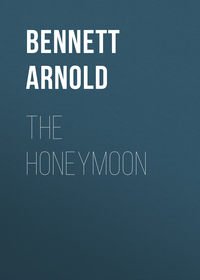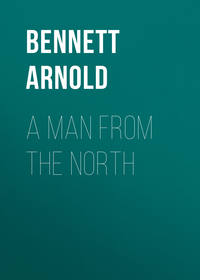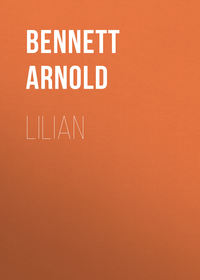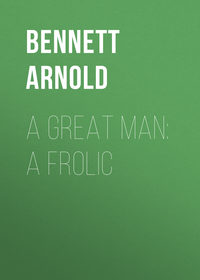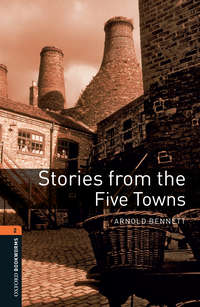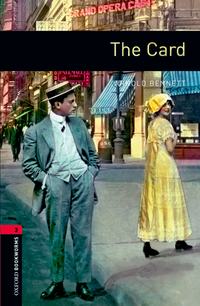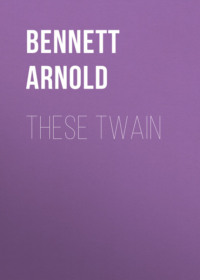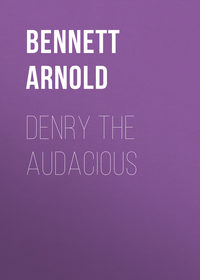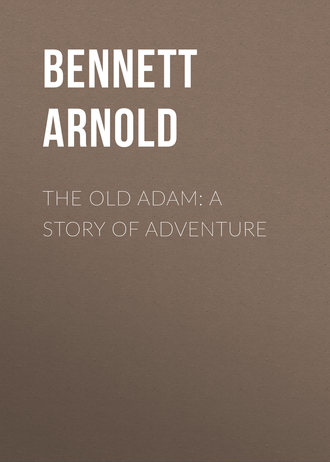 полная версия
полная версияThe Old Adam: A Story of Adventure
Edward Henry could not tolerate Mr. Bryany's look. It was a look which he had never been able to tolerate on the features of anybody whatsoever. He reminded himself that his secret object in accompanying Mr. Bryany to the Turk's Head was to repay Mr. Bryany-in what coin he knew not yet-for the aspersions which at the music-hall he had cast upon England in general and upon the Five Towns in particular, and also to get revenge for having been tricked into believing, even for a moment, that there was really a case of hydrophobia at Bleakridge. It is true that Mr. Bryany was innocent of this deception, which had been accomplished by Robert Brindley, but that was a detail which did not trouble Edward Henry, who lumped his grievances together-for convenience.
He had been reflecting that some sentimental people, unused to the ways of paternal affection in the Five Towns, might consider him a rather callous father; he had been reflecting, again, that Nellie's suggestion of blood-poisoning might not be as entirely foolish as feminine suggestions in such circumstances too often are. But now he put these thoughts away, reassuring himself against hydrophobia anyhow, by the recollection of the definite statement of the Encyclopedia. Moreover, had he not inspected the wound-as healthy a wound as you could wish for?
And he said in a new tone, very curtly:
"Now, Mr. Bryany, what about this little affair of yours?"
He saw that Mr. Bryany accepted the implied rebuke with the deference properly shown by a man who needs something towards the man in possession of what he needs. And studying the fellow's countenance, he decided that, despite its brassiness and simple cunning, it was scarcely the countenance of a rascal.
"Well, it's like this," said Mr. Bryany, sitting down opposite Edward Henry at the centre table, and reaching with obsequious liveliness for the despatch-box.
He drew from the despatch-box, which was lettered "W.C.B.," first a cut-glass flask of whisky, with a patent stopper, and then a spacious box of cigarettes.
"I always travel with the right sort," he remarked, holding the golden liquid up to the light. "It's safer, and it saves any trouble with orders after closing-time. These English hotels, you know-!"
So saying, he dispensed whisky and cigarettes, there being a siphon and glasses, and three matches in a match-stand, on the table.
"Here's looking!" he said, with raised glass.
And Edward Henry responded, in conformity with the changeless ritual of the Five Towns:
"I looks!"
And they sipped.
Whereupon Mr. Bryany next drew from the despatch-box a piece of transparent paper.
"I want you to look at this plan of Piccadilly Circus and environs," said he.
Now there is a Piccadilly in Hanbridge; also a Pall Mall, and a Chancery Lane. The adjective "metropolitan," applied to Hanbridge is just.
"London?" questioned Edward Henry. "I understood London when we were chatting over there." With his elbow he indicated the music-hall, somewhere vaguely outside the room.
"London," said Mr. Bryany.
And Edward Henry thought:
"What on earth am I meddling with London for? What use should I be in London?"
"You see the plot marked in red?" Mr. Bryany proceeded. "Well, that's the site. There's an old chapel on it now."
"What do all these straight lines mean?" Edward Henry inquired, examining the plan. Lines radiated from the red plot in various directions.
"Those are the lines of vision," said Mr. Bryany. "They show just where an electric sign at the corner of the front of the proposed theatre could be seen from. You notice the site is not in the Circus itself-a shade to the north." Mr. Bryany's finger approached Edward Henry's on the plan and the clouds from their cigarettes fraternally mingled. "Now you see by those lines that the electric sign of the proposed theatre would be visible from nearly the whole of Piccadilly Circus, parts of Lower Regent Street, Coventry Street, and even Shaftesbury Avenue. You see what a site it is-absolutely unique."
Edward Henry asked coldly:
"Have you bought it?"
"No," Mr. Bryany seemed to apologise, "I haven't exactly bought it; but I've got an option on it."
The magic word "option" wakened the drowsy speculator in Edward Henry. And the mere act of looking at the plan endowed the plot of land with reality. There it was. It existed.
"An option to buy it?"
"You can't buy land in the West End of London," said Mr. Bryany sagely. "You can only lease it."
"Well, of course," Edward Henry concurred.
"The freehold belongs to Lord Woldo, now aged six months."
"Really!" murmured Edward Henry.
"I've got an option to take up the remainder of the lease, with sixty-four years to run, on the condition I put up a theatre. And the option expires in exactly a fortnight's time."
Edward Henry frowned, and then asked:
"What are the figures?"
"That is to say," Mr. Bryany corrected himself, smiling courteously, "I've got half the option."
"And who's got the other half?"
"Rose Euclid's got the other half."
At the mention of the name of one of the most renowned star actresses in England, Edward Henry excusably started.
"Not the-?" he exclaimed.
Mr. Bryany nodded proudly, blowing out much smoke.
"Tell me," asked Edward Henry, confidentially, leaning forward, "where do those ladies get their names from?"
"It happens in this case to be her real name," said Mr. Bryany. "Her father kept a tobacconists' shop in Cheapside. The sign was kept up for many years, until Rose paid to have it changed."
"Well, well!" breathed Edward Henry, secretly thrilled by these extraordinary revelations. "And so you and she have got it between you?"
Mr. Bryany said:
"I bought half of it from her some time ago. She was badly hard up for a hundred pounds, and I let her have the money." He threw away his cigarette half-smoked, with a free gesture that seemed to imply that he was capable of parting with a hundred pounds just as easily.
"How did she get the option?" Edward Henry inquired, putting into the query all the innuendo of a man accustomed to look at great worldly affairs from the inside.
"How did she get it? She got it from the late Lord Woldo. She was always very friendly with the late Lord Woldo, you know." Edward Henry nodded. "Why, she and the Countess of Chell are as thick as thieves! You know something about the countess down here, I reckon?"
The Countess of Chell was the wife of the supreme local magnate.
Edward Henry answered calmly, "We do."
He was tempted to relate a unique adventure of his youth, when he had driven the countess to a public meeting in his mule-carriage; but sheer pride kept him silent.
"I asked you for the figures," he added in a manner which requested Mr. Bryany to remember that he was the founder, chairman, and proprietor of the Five Towns Universal Thrift Club, one of the most successful business organisations in the Midlands.
"Here they are," said Mr. Bryany, passing across the table a sheet of paper.
And as Edward Henry studied them he could hear Mr. Bryany faintly cooing into his ear: "Of course Rose got the ground-rent reduced. And when I tell you that the demand for theatres in the West End far exceeds the supply, and that theatre rents are always going up; when I tell you that a theatre costing £25,000 to build can be let for £11,000 a year, and often £300 a week on a short term-" And he could hear the gas singing over his head; and also, unhappily, he could hear Dr. Stirling talking to his wife and saying to her that the bite was far more serious than it looked, and Nellie hoping very audibly that nothing had "happened" to him, her still absent husband. And then he could hear Mr. Bryany again:
"When I tell you-"
"When you tell me all this, Mr. Bryany," he interrupted with the ferocity which in the Five Towns is regarded as mere directness, "I wonder why the devil you want to sell your half of the option if you do want to sell it. Do you want to sell it?"
"To tell you the truth," said Mr. Bryany as if up to that moment he had told naught but lies, "I do."
"Why?"
"Oh, I'm always travelling about, you see. England one day, America the next." Apparently he had quickly abandoned the strictness of veracity. "All depends on the governor's movements. I couldn't keep a proper eye on an affair of that kind."
Edward Henry laughed:
"And could I?"
"Chance for you to go a bit oftener to London," said Mr. Bryany, laughing too. Then, with extreme and convincing seriousness, "You're the very man for a thing of that kind. And you know it."
Edward Henry was not displeased by this flattery.
"How much?"
"How much? Well, I told you frankly what I paid. I made no concealment of that, did I now? Well, I want what I paid. It's worth it!"
"Got a copy of the option, I hope!"
Mr. Bryany produced a copy of the option.
"I am nothing but an infernal ass to mix myself up in a mad scheme like this," said Edward Henry to his soul, perusing the documents. "It's right off my line, right bang off it. But what a lark!" But even to his soul he did not utter the remainder of the truth about himself, namely, "I should like to cut a dash before this insufferable patroniser of England and the Five Towns."
Suddenly something snapped within him, and he said to Mr. Bryany:
"I'm on!"
Those words and no more!
"You are?" Mr. Bryany exclaimed, mistrusting his ears.
Edward Henry nodded.
"Well, that's business anyway," said Mr. Bryany, taking a fresh cigarette and lighting it.
"It's how we do business down here," said Edward Henry, quite inaccurately; for it was not in the least how they did business down there.
Mr. Bryany asked, with a rather obvious anxiety:
"But when can you pay?
"Oh, I'll send you a cheque in a day or two." And Edward Henry in his turn took a fresh cigarette.
"That won't do! That won't do!" cried Mr. Bryany. "I absolutely must have the money to-morrow morning in London. I can sell the option in London for eighty pounds, I know that."
"You must have it?"
"Must!"
They exchanged glances. And Edward Henry, rapidly acquiring new knowledge of human nature on the threshold of a world strange to him, understood that Mr. Bryany, with his private sitting-room and his investments in Seattle and Calgary, was at his wits' end for a bag of English sovereigns, and had trusted to some chance encounter to save him from a calamity. And his contempt for Mr. Bryany was that of a man to whom his bankers are positively servile.
"Here," Mr. Bryany almost shouted, "don't light your cigarette with my option!"
"I beg pardon," Edward Henry apologised, dropping the document which he had creased into a spill. There were no matches left on the table.
"I'll find you a match."
"It's of no consequence," said Edward Henry, feeling in his pockets. Having discovered therein a piece of paper, he twisted it and rose to put it to the gas.
"Could you slip round to your bank and meet me at the station in the morning with the cash?" suggested Mr. Bryany.
"No, I couldn't," said Edward Henry.
"Well, then, what-?"
"Here, you'd better take this," the Card, reborn, soothed his host, and, blowing out the spill which he had just ignited at the gas, he offered it to Mr. Bryany.
"What?"
"This, man!"
Mr. Bryany, observing the peculiarity of the spill, seized it and unrolled it, not without a certain agitation.
He stammered:
"Do you mean to say it's genuine?"
"You'd almost think so, wouldn't you?" said Edward Henry. He was growing fond of this reply, and of the enigmatic playful tone that he had invented for it.
"But-"
"We may, as you say, look twice at a fiver," continued Edward Henry, "but we're apt to be careless about hundred-pound notes in this district. I daresay that's why I always carry one."
"But it's burnt!"
"Only just the edge, not enough to harm it. If any bank in England refuses it, return it to me, and I'll give you a couple more in exchange. Is that talking?"
"Well, I'm dashed!" Mr. Bryany attempted to rise, and then subsided back into his chair. "I am simply and totally dashed!" He smiled weakly, hysterically.
And in that instant Edward Henry felt all the sweetness of a complete and luscious revenge.
He said commandingly:
"You must sign me a transfer. I'll dictate it."
Then he jumped up.
"You're in a hurry?"
"I am. My wife is expecting me. You promised to find me a match." Edward Henry waved the unlit cigarette as a reproach to Mr. Bryany's imperfect hospitality.
IVThe clock of Bleakridge Church, still imperturbably shining in the night, showed a quarter to one when he saw it again on his hurried and guilty way home. The pavements were drying in the fresh night wind, and he had his overcoat buttoned up to the neck. He was absolutely solitary in the long, muddy perspective of Trafalgar Road. He walked because the last tram-car was already housed in its shed at the other end of the world, and he walked quickly because his conscience drove him onwards. And yet he dreaded to arrive, lest a wound in the child's leg should have maliciously decided to fester in order to put him in the wrong. He was now as apprehensive concerning that wound as Nellie herself had been at tea-time.
But in his mind, above the dark gulf of anxiety, there floated brighter thoughts. Despite his fears and his remorse as a father, he laughed aloud in the deserted street when he remembered Mr. Bryany's visage of astonishment upon uncreasing the note. Indubitably, he made a terrific and everlasting impression upon Mr. Bryany. He was sending Mr. Bryany out of the Five Towns a different man. He had taught Mr. Bryany a thing or two. To what brilliant use had he turned the purely accidental possession of a hundred-pound note! One of his finest inspirations-an inspiration worthy of the great days of his youth! Yes, he had had his hour that evening, and it had been a glorious one. Also, it had cost him a hundred pounds, and he did not care; he would retire to bed with a net gain of two hundred and forty-one pounds instead of three hundred and forty-one pounds, that was all.
For he did not mean to take up the option. The ecstasy was cooled now, and he saw clearly that London and theatrical enterprises therein would not be suited to his genius. In the Five Towns he was on his own ground; he was a figure; he was sure of himself. In London he would be a provincial, with the diffidence and the uncertainty of a provincial. Nevertheless, London seemed to be summoning him from afar off, and he dreamt agreeably of London as one dreams of the impossible East.
As soon as he opened the gate in the wall of his property, he saw that the drawing-room was illuminated and all the other front rooms in darkness. Either his wife or his mother, then, was sitting up in the drawing-room. He inserted a cautious latch-key into the door, and entered the silent home like a sinner. The dim light in the hall gravely reproached him. All his movements were modest and restrained; no noisy rattling of his stick now.
The drawing-room door was slightly ajar. He hesitated, and then, nerving himself, pushed against it.
Nellie, with lowered head, was seated at a table, mending, the image of tranquillity and soft resignation. A pile of children's garments lay by her side, but the article in her busy hands appeared to be an undershirt of his own. None but she ever reinforced the buttons on his linen. Such was her wifely rule, and he considered that there was no sense in it. She was working by the light of a single lamp on the table, the splendid chandelier being out of action. Her economy in the use of electricity was incurable, and he considered that there was no sense in that either.
She glanced up with a guarded expression that might have meant anything.
He said:
"Aren't you trying your eyes?"
And she replied:
"Oh, no!"
Then, plunging, he came to the point:
"Well, doctor been here?"
She nodded.
"What does he say?"
"It's quite all right. He did nothing but cover up the place with a bit of cyanide gauze."
Instantly, in his own esteem, he regained perfection as a father. Of course the bite was nothing! Had he not said so from the first? Had he not been quite sure throughout that the bite was nothing?
"Then why did you sit up?" he asked, and there was a faint righteous challenge in his tone.
"I was anxious about you. I was afraid-"
"Didn't Stirling tell you I had some business?"
"I forget-"
"I told him to, anyhow-important business."
"It must have been," said Nellie in an inscrutable voice.
She rose and gathered together her paraphernalia, and he saw that she was wearing the damnable white apron. The close atmosphere of the home enveloped and stifled him once more. How different was this exasperating interior from the large jolly freedom of the Empire Music Hall, and from the whisky, cigarettes, and masculinity of that private room at the Turk's Head!
"It was!" he repeated grimly and resentfully. "Very important! And I'll tell you another thing, I shall probably have to go to London."
He said this just to startle her.
"It will do you all the good in the world," she replied angelically, but unstartled. "It's just what you need." And she gazed at him as though his welfare and felicity were her sole preoccupation.
"I meant I might have to stop there quite a while," he insisted.
"If you ask me," she said, "I think it would do us all good."
So saying she retired, having expressed no curiosity whatever as to the nature of the very important business in London.
For a moment, left alone, he was at a loss. Then, snorting, he went to the table and extinguished the lamp. He was now in darkness. The light in the hall showed him the position of the door.
He snorted again. "Oh, very well then!" he muttered. "If that's it! I'm hanged if I don't go to London! I'm hanged if I don't go to London!"
CHAPTER III
WILKINS'S
IThe early adventures of Alderman Machin of Bursley at Wilkins' Hotel, London, were so singular and to him so refreshing that they must be recounted in some detail.
He went to London by the morning express from Knype, on the Monday week after his visit to the music-hall. In the meantime he had had some correspondence with Mr. Bryany, more poetic than precise, about the option, and had informed Mr. Bryany that he would arrive in London several days before the option expired. But he had not given a definite date. The whole affair, indeed, was amusingly vague; and, despite his assurances to his wife that the matter was momentous, he did not regard his trip to London as a business trip at all, but rather as a simple freakish change of air. The one certain item in the whole situation was that he had in his pocket a quite considerable sum of actual money, destined-he hoped but was not sure-to take up the option at the proper hour.
Nellie, impeccable to the last, accompanied him in the motor to Knype, the main-line station. The drive, superficially pleasant, was in reality very disconcerting to him. For nine days the household had talked in apparent cheerfulness of Father's visit to London, as though it were an occasion for joy on Father's behalf, tempered by affectionate sorrow for his absence. The official theory was that all was for the best in the best of all possible homes, and this theory was admirably maintained. And yet everybody knew-even to Maisie-that it was not so; everybody knew that the master and the mistress of the home, calm and sweet as was their demeanour, were contending in a terrific silent and mysterious altercation, which in some way was connected with the visit to London. So far as Edward Henry was concerned, he had been hoping for some decisive event-a tone, gesture, glance, pressure-during the drive to Knype, which offered the last chance of a real concord. No such event occurred. They conversed with the same false cordiality as had marked their relations since the evening of the dog-bite. On that evening Nellie had suddenly transformed herself into a distressingly perfect angel, and not once had she descended from her high estate. At least daily she had kissed him-what kisses! Kisses that were not kisses! Tasteless mockeries, like non-alcoholic ale! He could have killed her, but he could not put a finger on a fault in her marvellous wifely behaviour; she would have died victorious.
So that his freakish excursion was not starting very auspiciously. And, waiting with her for the train on the platform at Knype, he felt this more and more. His old clerk Penkethman was there to receive certain final instructions on Thrift Club matters, and the sweetness of Nellie's attitude towards the ancient man, and the ancient's man's naïve pleasure therein, positively maddened Edward Henry. To such an extent that he began to think: "Is she going to spoil my trip for me?"
Then Brindley came up. Brindley, too, was going to London. And Nellie's saccharine assurances to Brindley that Edward Henry really needed a change just about completed Edward Henry's desperation. Not even the uproarious advent of two jolly wholesale grocers, Messieurs Garvin and Quorrall, also going to London, could effectually lighten his pessimism.
When the train steamed in, Edward Henry, in fear, postponed the ultimate kiss as long as possible. He allowed Brindley to climb before him into the second-class compartment, and purposely tarried in finding change for the porter; and then he turned to Nellie, and stooped. She raised her white veil and raised the angelic face. They kissed, – the same false kiss, – and she was withdrawing her lips. But suddenly she put them again to his for one second, with a hysterical clinging pressure. It was nothing. Nobody could have noticed it. She herself pretended that she had not done it. Edward Henry had to pretend not to notice it. But to him it was everything. She had relented. She had surrendered. The sign had come from her. She wished him to enjoy his visit to London.
He said to himself:
"Dashed if I don't write to her every day!"
He leaned out of the window as the train rolled away, and waved and smiled to her, not concealing his sentiments now; nor did she conceal hers as she replied with exquisite pantomime to his signals. But if the train had not been rapidly and infallibly separating them, the reconciliation could scarcely have been thus open. If for some reason the train had backed into the station and ejected its passengers, those two would have covered up their feelings again in an instant. Such is human nature in the Five Towns.
When Edward Henry withdrew his head into the compartment, Brindley and Mr. Garvin, the latter standing at the corridor door, observed that his spirits had shot up in the most astonishing manner, and in their blindness they attributed the phenomenon to Edward Henry's delight in a temporary freedom from domesticity.
Mr. Garvin had come from the neighbouring compartment, which was first-class, to suggest a game at bridge. Messieurs Garvin and Quorrall journeyed to London once a week and sometimes oftener, and, being traders, they had special season-tickets. They travelled first-class because their special season-tickets were first-class. Brindley said that he didn't mind a game, but that he had not the slightest intention of paying excess fare for the privilege. Mr. Garvin told him to come along and trust in Messieurs Garvin and Quorrall. Edward Henry, not nowadays an enthusiastic card-player, enthusiastically agreed to join the hand, and announced that he did not care if he paid forty excess fares. Whereupon Robert Brindley grumbled enviously that it was "all very well for millionaires…" They followed Mr. Garvin into the first-class compartment; and it soon appeared that Messrs. Garvin and Quorrall did in fact own the train, and that the London and North Western Railway was no more than their wash-pot.
"Bring us a cushion from somewhere, will ye?" said Mr. Quorrall casually to a ticket-collector who entered.
And the resplendent official obeyed. The long cushion, rapt from another compartment, was placed on the knees of the quartette, and the game began. The ticket-collector examined the tickets of Brindley and Edward Henry, and somehow failed to notice that they were of the wrong colour. And at this proof of their influential greatness, Messieurs Garvin and Quorrall were both secretly proud.


